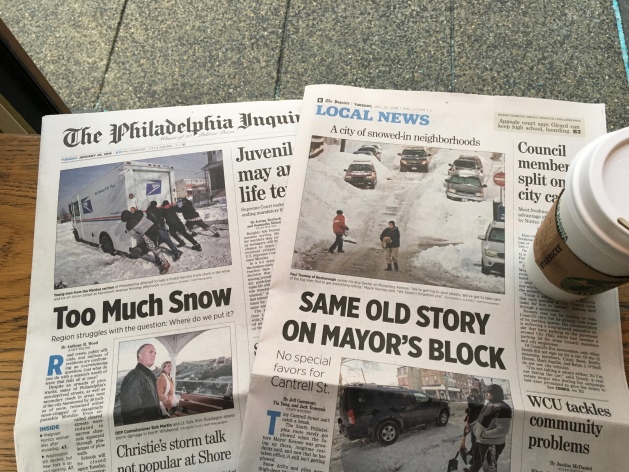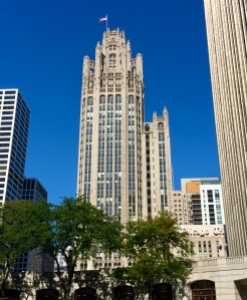Previously published at GBH News.
In response to the rampaging vulture capitalism that was threatening to destroy their newspaper, union employees at the Hartford Courant last year launched a campaign to find a nonprofit organization that would save their jobs and the journalism their community depends on.
Not only did they fail, but the situation at the Courant, the oldest continuously published newspaper in America, just got infinitely worse.
Meanwhile, 300 miles to the south, a similar effort was under way to save The Baltimore Sun. It paid off big-time, as the Sun and several sister papers are now on the verge of being acquired by a nonprofit foundation that will operate them in the public interest.
No doubt you’ve read a lot here and elsewhere about the local news crisis, and about the role of hedge funds and corporate chain owners in hollowing out once-great newspapers that were already struggling.
Yet what we don’t talk about often enough is the sheer random nature of it all — and why we assume there’s nothing that can be done about a hedge fund destroying a paper here or a nonprofit or benevolent billionaire saving a paper there. We have been so conditioned to thinking that the untrammeled forces of the market must be allowed to play out that we’ve lost sight of what we’re losing. It shouldn’t be this way.
Last week was a particularly fraught moment in the collapse of local journalism.
First we learned that the hedge fund Alden Global Capital, the most avaricious newspaper owner in the country (don’t just take my word for it; as Margaret Sullivan of The Washington Post puts it, “Being bought by Alden is the worst possible fate for the newspapers and the communities involved”), was making a $630 million bid to increase its share of Tribune Publishing — whose holdings include the Courant — from 32% to 100%.
The announcement came with at least a little bit of good news: Alden would spin off The Baltimore Sun to a nonprofit. Even better, Patrick Soon-Shiong, the billionaire owner of the Los Angeles Times and The San Diego Union-Tribune, was in a position to block Alden if he so chose.
Rick Edmonds of Poynter speculated that wouldn’t happen. But hope springs eternal — or at least until last Friday. That’s when Lukas Alpert of The Wall Street Journal reported that Soon-Shiong himself might be looking to get out of the newspaper business less than three years after he got in. Worse, Soon-Shiong was said to be looking at offloading his papers to a larger media group. Though neither Alpert nor his soures said so, Alden would be the most likely buyer.
Soon-Shiong, fortunately, denied he’d lost interest in newspapers. But Alpert is a good reporter, so it’s hard to believe that there isn’t something to it.
Call it Mogul Roulette.
So let’s survey the landscape, shall we? Tribune’s papers, which include the Chicago Tribune, New York’s Daily News, the Orlando Sentinel, the Courant and others, will be gutted if the Alden deal goes through. In fact, the Courant is already operating with neither a printing press nor a newsroom.
On the other hand, The Baltimore Sun has been granted a new lease on life. We don’t know what’s going to happen in L.A. or San Diego. And, here and there, large regional papers with either strong private ownership (The Boston Globe, the Portland Press Herald, the Star Tribune of Minneapolis, The Seattle Times) or nonprofit control (The Philadelphia Inquirer, The Salt Lake Tribune, the Tampa Bay Times and, soon, the Sun) are providing their communities with the news and information they need, even if they still face challenges.
This situation is unacceptable. Reliable news is vital to democracy, and though we don’t necessarily need legacy newspapers to deliver it, they remain the most widespread and efficient means for doing so. As the media scholar Alex Jones has written, newspapers continue to produce the overwhelming share of accountability journalism that we need to govern ourselves — what Jones calls the “iron core.” We shouldn’t be dependent on whether the newspaper in our community is owned by someone who believes in journalism’s civic mission or who simply sees it as a piggy bank to be depleted before moving on to the next victim.
Several years ago I had a conversation about newspaper ownership with Victor Pickard, a scholar at Penn’s Annenberg School; he would later go on to write “Democracy without Journalism?,” a call for (among other things) greatly increased funding for public media. Why, I asked him, should communities have so little control over who owns their local newspaper?
We didn’t come up with any answers that day, although Pickard did suggest that antitrust laws be used more aggressively. These days, unfortunately, we are dealing with the antitrust legacy of Robert Bork, who developed a theory that any amount of monopolization is just fine as long as it doesn’t drive up prices.
The Bork doctrine makes no sense in the shrinking newspaper business. At one time Tribune Publishing, then known as tronc, proposed uniting the L.A. Times, the Union-Tribune and, in the middle, the Orange County Register, whose previous owner, Aaron Kushner, had steered into bankruptcy. Soon-Shiong could have been the savior of all three papers instead of just the two he bought from tronc. Instead, a federal judge ruled that such a combination would violate antitrust laws because it might drive up the price of ads. (Your honor, we need to drive up the price of ads.) Yet, paradoxically, Bork’s theories say nothing about giant chains stretching across the country and destroying local newspapers.
What comes next? Maybe Soon-Shiong will step forward and outbid Alden for the rest of Tribune, placing the entire chain in much better hands. Or maybe he’ll sell to Alden. In any case, it’s unacceptable for the fate of local journalism to be left to the whims of unbridled capitalism. We need to start thinking about what alternatives to that model might look like.









